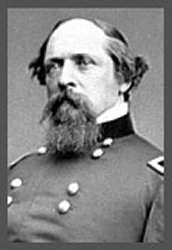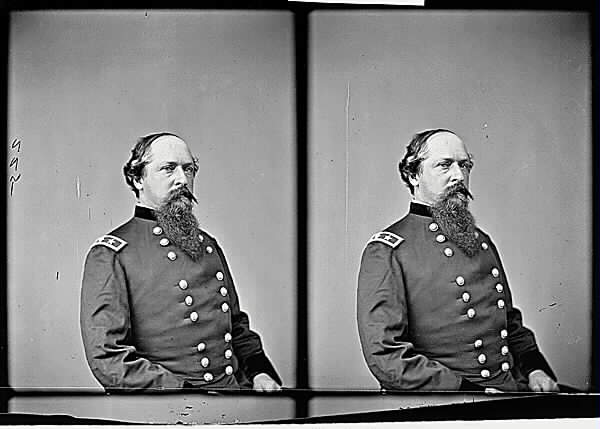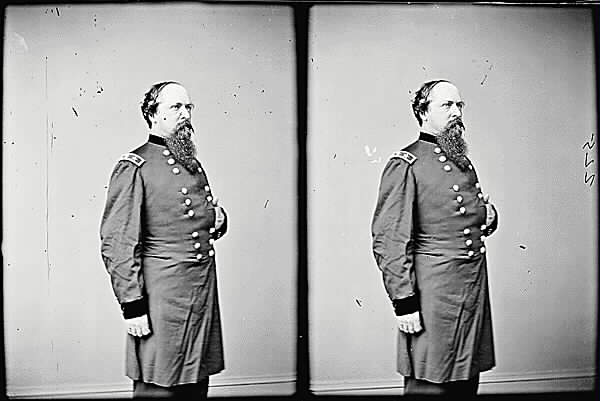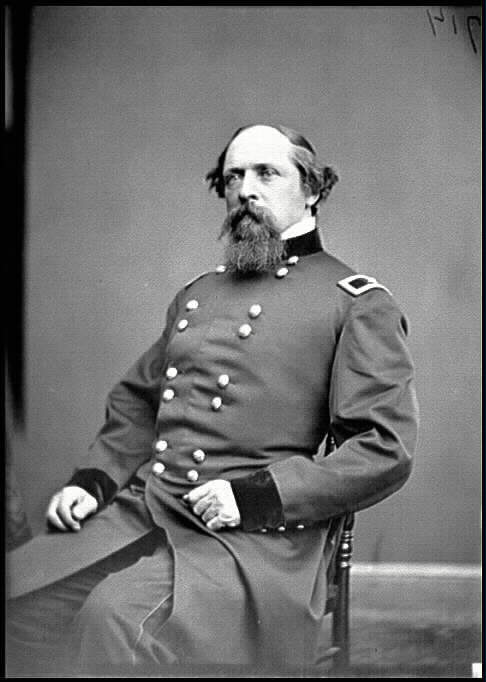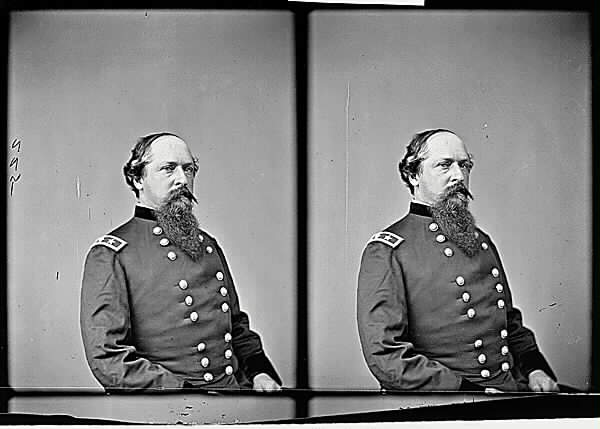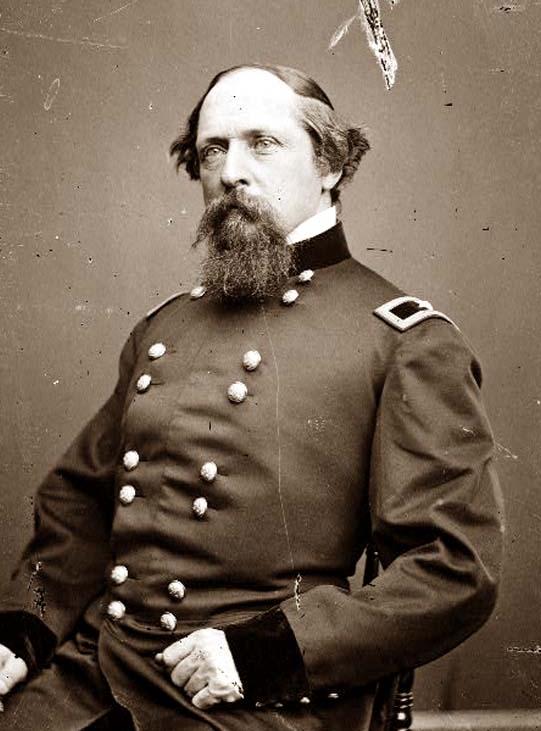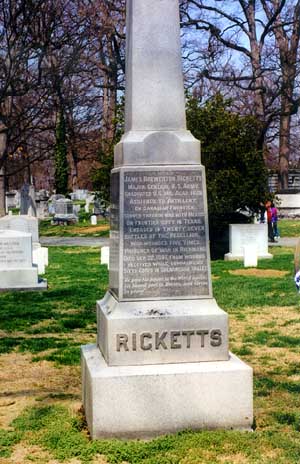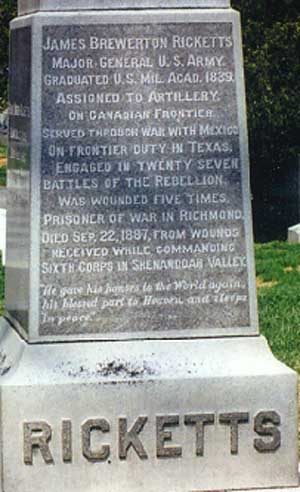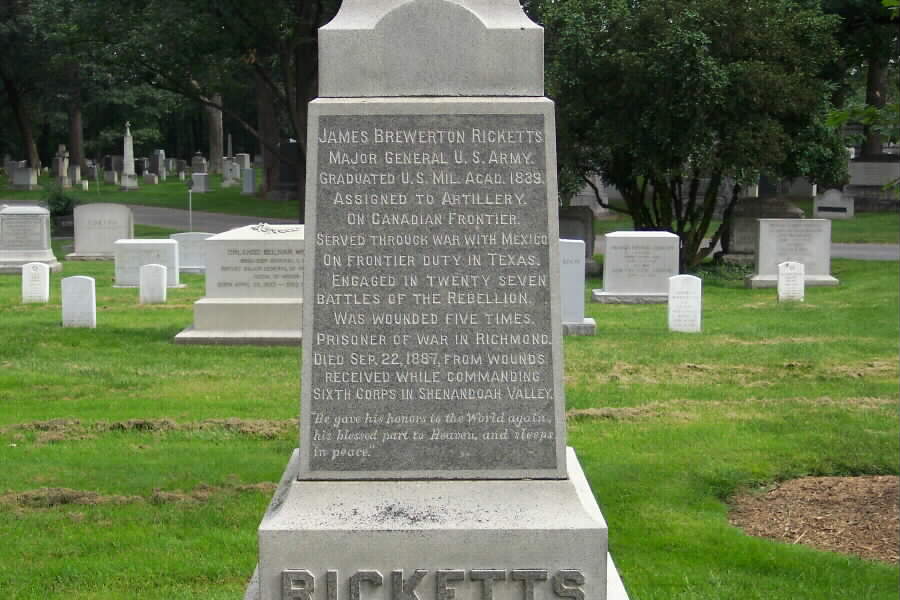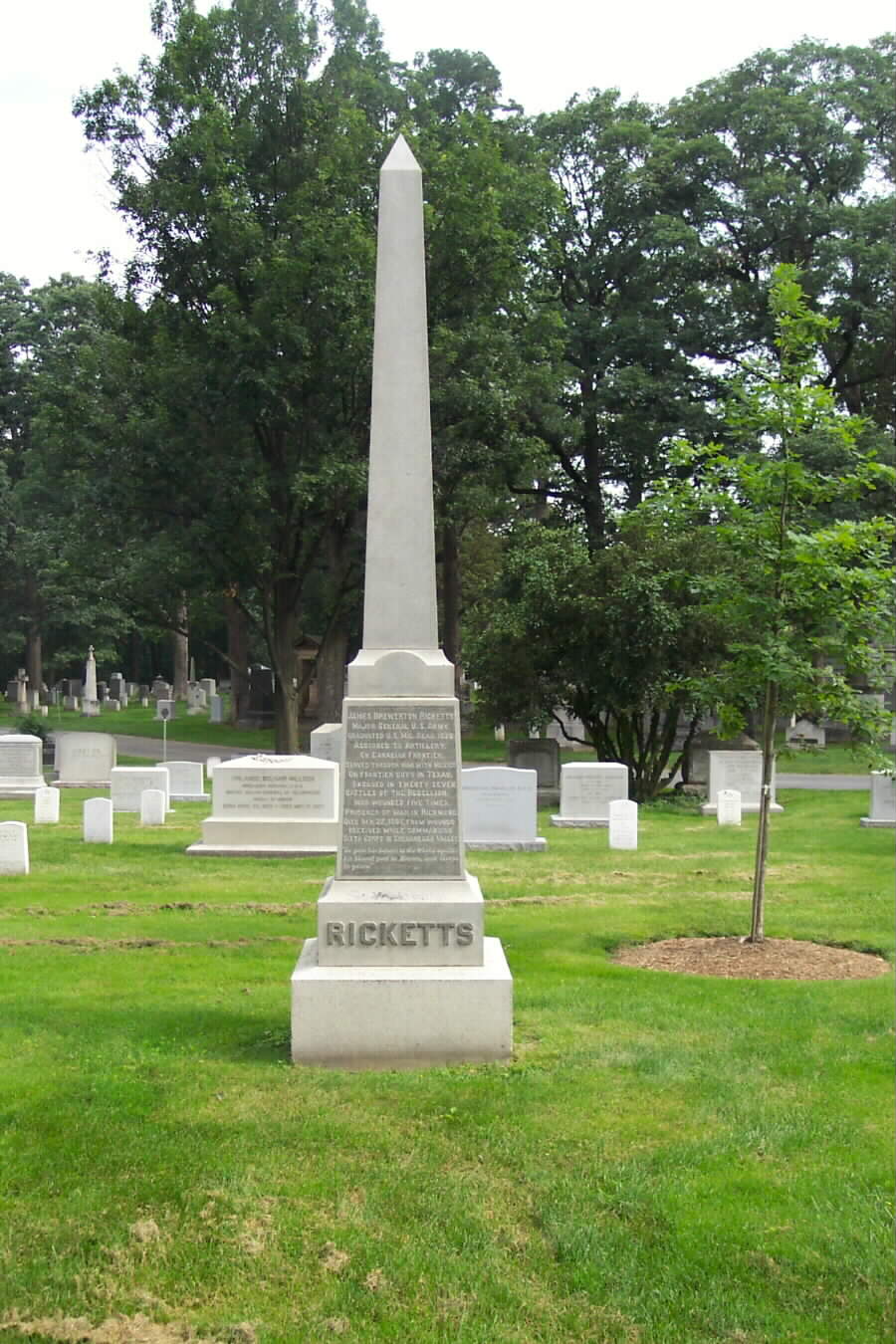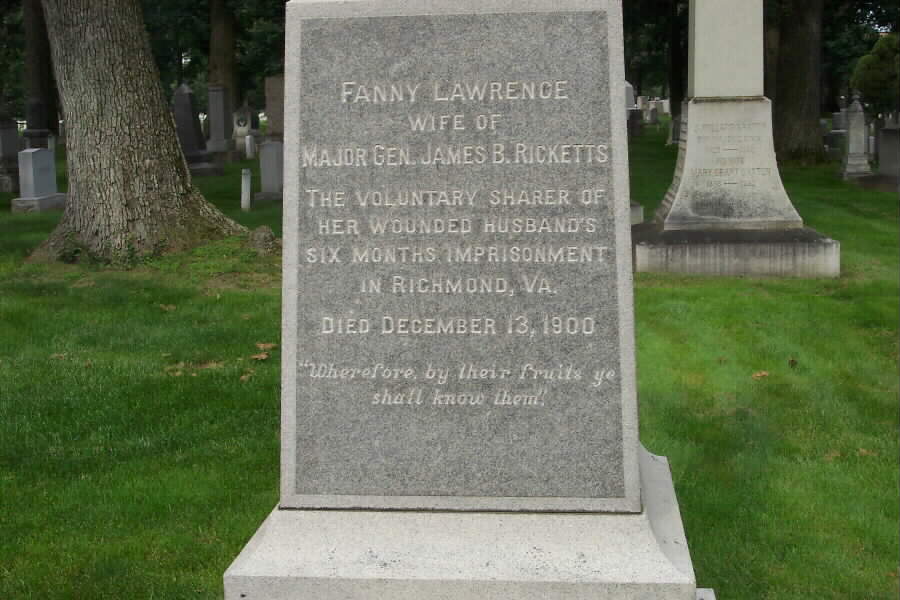Born June 21, 1817, native of New York City, James B,. Ricketts was appointed to the United States Military Academy in 1835 and graduated in the class of 1839.
His pre-Civil War career as officer of artillery was unexceptional. He received no brevet promotions in the Mexican War, although he took part in battles of Monterey, and Buena Vista.
He was made a Captain in 1852, and at First Manassas, July 21, 1861, he commanded a battery attached to Franklin's Brigade of Heintzelman's Division. During this battle, he was shot four times and taken prisoner by Confederates, not being exchanged until January 1862.
He was promoted to Brigadier General of Volunteers, April 30, 1862, to rank from the day of the battle “for gallant and meritorious conduct” and assigned to command of a Division of McDowell's corps, which he commanded at Cedar Mountain (where he covered N. P. Banks' withdrawal) and at Second Manassas. At Second Manassas, his Division was thrown forward by Irvin McDowell into Thorough-fare Gap in the Bull Run Mountains to bar advance of James Longstreet, who was seeking to unite his wing of the Army of Northern Virginia with that of Stonewall Jackson. Rufus King's Division was ordered to Gainesville in support, but King withdrew without orders, compelling Ricketts, who was being flanked and in danger of being cut off, to withdraw also. Some historians have criticized his actions and have attempted to infer from findings of the subsequent “McDowell Board of Inquiry” that the board found him guilty of a “grave error.” This writer feels that “grave error” was charged to King and that Ricketts' subsequent retirement was a logical consequence thereof. At Sharpsburg, he had two horses killed under him and he was badly injured when the second one fell on him. When he recovered sufficiently for duty, he was appointed to the Fitz John Porter court-martial, and as result his reputation has suffered as has than of certain other members who were patently self-servers. With the exception of Prentiss, to whom no suspicion attaches, and Ricketts, every judge was beholden to Edwin M. Stanton for tenure or impending promotion. The other judges, after the guilty verdict, were remunerated in number of ways. Only Ricketts, significantly, “was not promoted after the verdict was rendered, nor one of the brigadiers who at the close of the war who were made Major General.” This suggests that he may have voted for acquittal, thus incurring the War Department’s displeasure. For full disclosure see Eisenschiml, “The Celebrated Case of Fitz John Porter,” and Official Records, XII, Part 1, Pages 323-32, and XII, Supplement to Part 2.
He did not return to the field until March 1864, when he was assigned to a Division of Sedgwick's VI Corps, which he led through Grant's Overland Campaign against Richmond. In July 1864, his command, numbering 3,350 muskets, was hurried north to oppose Jubal Early's raid on Washington, D.C. He arrived at the Monocacy River in time to bear the brunt of the Confederate assault and to delay Early for a vital 24 hours. Lew Wallace, his superior in the field, recorded that his Division “fought magnificently”; of the total Union loss of 677 men, his Division lost 595. Then he was engaged in Philip Sheridan's Shenandoah Campaign; at Cedar Creek in October, while temporarily commanding the Corps, he was wounded by bullet through his chest which disabled him for life. Nonetheless, he returned to command of his Division two days before Robert E. Lee's surrender at Appomattox.
He was breveted Major General of Volunteers, August 1, 1864, and in the Regular Army as of March 13, 1865. On January 3, 1867, he retired from active service as a Major General for disability from wounds received in battle; however, he continued to do court-martial duty until 1869. He lived in Washington, D.C. until his death, September 22, 1887.
“Assigned to artillery on the Canadian frontier. Served through the War with Mexico. Frontier duty in Texas. Engaged in twenty seven battles of the rebellion. Was wounded five times. Prisoner of war in Richmond. Died September 27, 1887 from wounds received while commanding the Sixth Army Corps in the Shenandoah Valley. He gave his honors to the world again. His blessings part to heaven, and sleeps in peace.”
Section 1, Grave 17
Ricketts, Fannie Lawrence
Wife of James Brewerton Ricketts.
“The voluntary sharer of her wounded husband's imprisonment in Richmond, Virginia. Died: Dec 13, 1900. “Wherefore by their fruits, ye shall know him.”
James Brewerton Ricketts, soldier, born in New York city, 21 June, 1817 and died in Washington, D. C., 22 September, 1887.
He was graduated at the United States military academy in 1839, assigned to the 1st artillery, and served during the Canada border disturbances on garrison duty, and in the war with Mexico, taking part in the battle of Monterey, and holding the Rinconada pass during the battle of Buena Vista. He had been made 1st lieutenant, 21 April, 1846, became Captain on 3 August 1853, and served in Florida against the Seminole Indians, and subsequently on frontier duty in Texas.
At the beginning of the civil war he served in the defense of Washington, D. C., commanded a battery in the capture of Alexandria, Virginia, in 1861, was wounded and captured at Bull Run on 21 July, and on that day was breveted Lieutenant Colonel, and made Brigadier General of United States volunteers, He was confined as a prisoner of war, and afterward was on sick leave of absence until June, 1862, when he engaged in operations in the Shenandoah valley, and participated with the Army of the Potomac in the northern Virginia, the Maryland, and the Richmond campaigns, fighting in all the chief battles. On 1 June, 1863, he became Major of the 1st artillery, and he received the brevet of Colonel, United States army, for gallant and meritorious services at Cold Harbor, Virginia, 3 June, 1864. He served in the siege of Petersburg, Virginia, in that year in the defense of Maryland against General Jubal Early's raid, and in the Shenandoah campaign, receiving the brevet of Major General of volunteers on 1 August, 1864, for gallant conduct during the war, particularly in the battles of the campaign under General Ulysses S. Grant and General Philip It. Sheridan. He was severely wounded at Cedar Creek, Virginia, 19 October, 1864, and was on sick-leave from that date until 7 April, 1865. On 13 March, 1865, he was breveted Brigadier Genera, United States army, for gallant services at Cedar Creek, and Major General, United States army, for gallant and meritorious service in the field. On 28 July, 1865, he was assigned to the command of a district in the Department of Virginia, which post he held until 30 April, 1866, when he was mustered out of the volunteer service.
He was appointed Lieutenant Colonel, 21st Infantry, on 28 July, 1866, but declined this post. He was retired from active service on 3 January, 1867, for disability from wounds received in battle, and served on courts-martial from that date until 22 January, 1869.
Both the General and his wife are buried in Section 1 of Arlington National Cemetery. Also buried with them is their son, Basil Norris Ricketts, Sergeant, First United States Volunteer Cavalry (The Rough Riders).
Courtesy of the National Archives
Michael Robert Patterson was born in Arlington and is the son of a former officer of the US Army. So it was no wonder that sooner or later his interests drew him to American history and especially to American military history. Many of his articles can be found on renowned portals like the New York Times, Washingtonpost or Wikipedia.
Reviewed by: Michael Howard

